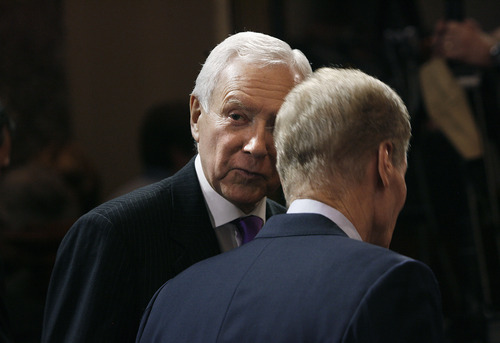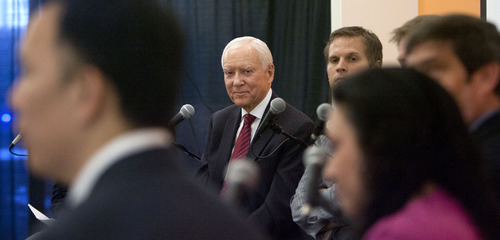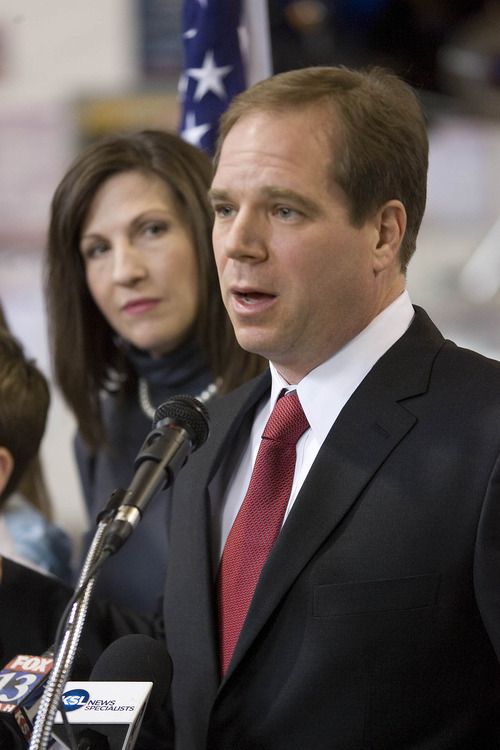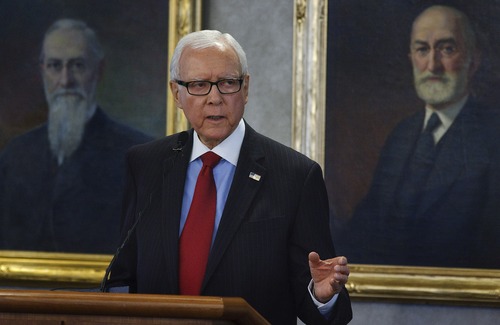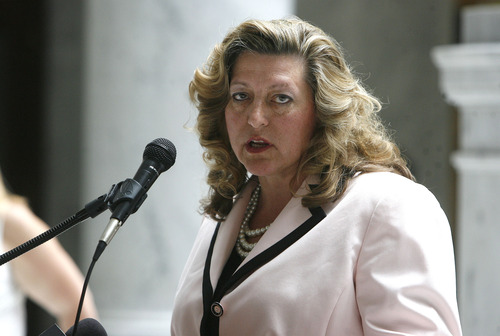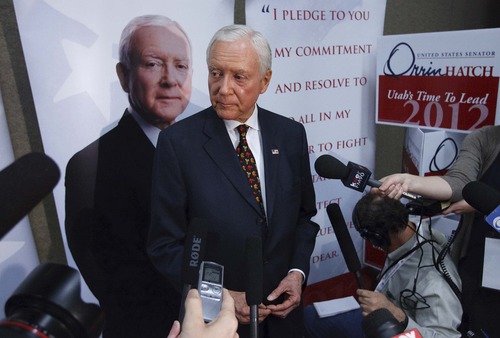This is an archived article that was published on sltrib.com in 2013, and information in the article may be outdated. It is provided only for personal research purposes and may not be reprinted.
Washington • Sen. Orrin Hatch swam quickly to the right to avoid being crushed by the tea party wave and since his 2012 re-election — his last, he says — he's ridden the currents back toward the middle.
Opponents and supporters alike say the old deal-making, pragmatic Hatch has returned.
As evidence, they point to the Utah Republican's vote in favor of the Senate's immigration bill, his ongoing bipartisan negotiations on tax reform and his willingness to support President Barack Obama's nominees in a compromise to protect the filibuster.
"This is the real Orrin Hatch," said Jim Dabakis, chairman of the Utah Democratic Party. "There is not an ounce of flaming liberal in him. There just isn't. But this is a man who is respected and listened to and he does his job in a fair way — except for the times he got off the reservation here because of that election."
Hatch watched as tea party Republicans in 2009 and early 2010 vilified former Sen. Bob Bennett as a big spender for his vote to bail out Wall Street and for his skill at securing funding for pet projects at home. They brought down Bennett, beating him at the state Republican convention, and eventually helped elect Sen. Mike Lee, who has gone on to become one of the most visible leaders of the tea party movement.
Those activists then turned their attention to Hatch, who, like Bennett, supported the bailout and fought for earmarked funding.
—
Political courtship • Almost instantly, Utah's longest-serving senator began courting these emboldened conservatives, who had no qualms challenging Republicans they found to be too moderate.
Hatch cozied up to David Kirkham, a specialty carmaker who funded many of the state's tea party gatherings and was seen as an influential voice in the movement. Kirkham eventually rebuffed Hatch and supported his GOP challenger, former state Sen. Dan Liljenquist.
Like Dabakis, Kirkham says Hatch swung to the right for the election and then back again since, but he doesn't criticize him for it.
"Do I wish he was a little more conservative? Of course, but certainly I'm not going to fault him," said Kirkham, who still talks to the senator regularly. "I think Senator Hatch's approach has always been one of compromise, and I don't mean that in a bad way."
Three prominent congressional scorecards showed how Hatch shifted to the right. The American Conservative Union gave him a rating of 76 in 2007 but he got a top score of 100 in 2010 and 2011. His rating by the National Taxpayers Union jumped from 57 to 99 and the Club for Growth saw him go from a 53 to a 97.
—
Abandoned causes • During this period, he walked away from the Dream Act, a bill that would give citizenship to certain children of undocumented immigrants, though he was an original sponsor. He has since embraced it again. He also voted against reauthorization of the Violence Against Women Act and the Children's Health Insurance Program, legislation he has previously championed.
Even his colleagues at the time took notice. Former Sen. Jim DeMint, R-S.C., who now runs the conservative Heritage Foundation, said in 2011 that Sen. Mike Lee was the only senator with "two votes."
"Every time he votes one way, Orrin's going to vote the same way," he said, though later he apologized to Hatch for the remark.
Hatch and Lee have their policy disagreements and that gap appears to be widening after last year's campaign. Hatch is more comfortable with the Patriot Act and the aggressive intelligence programs created since Sept. 11, while Lee worries they may violate the Constitution.
Hatch is more likely to vote for budget bills or a nominee of the Democratic president. And, this year, Hatch was among the Senate Republicans who worked on a comprehensive immigration-reform bill, which Lee flatly opposed.
An analysis of their voting records showed Hatch has disagreed with his home state colleague more frequently since securing the GOP nomination in June 2012. Before the primary election, Hatch sided against Lee on just 16.8 percent of votes. Since the primary, the opposing vote tally has jumped to 25.7 percent.
—
Steady as she goes • Hatch previously denied that he was voting more often with the far right leading up to his election and he denies now that he's shifted back into the Republican mainstream.
"I haven't changed," he said. "It is just in campaigns you answer the questions you are asked."
Now that his seventh and final election is over, it seems likely Hatch would feel a new freedom to vote without having to worry much about the reaction of voters. Hatch says that is not the case.
"I don't think winning an election should change your overall attitude," he said. "I'm going to be the same Orrin Hatch I've always been."
Holly Richardson sees it differently.
—
A clear shift • A former state lawmaker, Richardson ran Liljenquist's campaign against Hatch and says there's been a clear shift, though she notes that that's far from unusual in the world of politics.
"This is not unique to Orrin Hatch. This is the pattern that happens in elections," she said. "Mitt Romney had to campaign in a very different way to a very different group of voters to get out of the primary and then couldn't appeal to middle America."
Richardson supported Romney and while she said Hatch "has done some good things," she wishes Utah would have made a change. She says she's frustrated that voters and party leaders are too often swayed by election-year pandering.
"People do believe that this time will be different, that the change will be permanent," Richardson said. "But it is usually not."
Twitter: @mattcanham


